There was a feeling post Romero's Dawn of the Dead that maybe we were on to something new, an altogether decisive way to undermine Society's feelings about itself and point out the commercialisation of the dream. For sure Romero was still making and releasing movies with social satire at the forefront, however other movie markers simply saw the gold in them there hills and started pumping out the same zombie movie over and over again. We were knee deep in the zombie avalanche and to be honest it was getting pretty boring. How many movies does the world need that see's a group of people holed up against shambling creatures with a limited number of paths to go down? In 2002 Danny Boyle said enough was enough and unleashed 28 Days Later to Worldwide commercial success, the Brit Director took the concept of the zombie movie, revisited Last Man on Earth (1964), and hit audience with a new concept "the infected"! Just when we thought the dust had settled on the zombie wars debate was about to erupt once again, this time between rom-zom supporters and infected supporters, and this debate would rage across the expanding universe of the internet.
Slight revision here kids and then we'll move forward. Pre-Romero zombie movies dealt with victims of that old black magic who had been transformed from normal vibrant humans into shambling monsters. Said monsters, based on the stories of zombies coming out of Haiti, may or may not have died during their "resurrection", but in movie after movie, White Zombie immediately springs to mind, the victims of diabolic magic could revert if the protagonists knew how to achieve that. Chuck MacKenzie termed the phrase "trad-zom", Traditional Zombie, to over these older movies, though notably Wes Craven did revisit the idea in 1988's The Serpent and the Rainbow, a superior zombie movie to what we were normally getting by that year. Romero, more by chance than careful planning, took the zombie movie from its origins changed the requirement to zombies being resurrected corpses and just to make things juicy decided they should also be ghoulish in nature. In movie after movie since we have heard the catch cry of "shoot them in the head", right down to modern outings such as Robert Kirkman's The Walking Dead. MacKenzie once again termed a phrase for this brand of shuffling zombie when he coined "rom-zom", or Romero Zombies.
Part 3 - "No-one could run, all you could was climb... climb over more people... "
What Danny Boyle did with 28 Days Later was introduced the notion that "the living dead" were actually more alive than dead, they were infected with a virus that produced very rom-zom like tendencies. You'll note during this movie the infected don't attack each other, they are driven to attack anyone who isn't infected. The virus is transmitted by body fluids by the way, that sounding familiar? What Boyle managed to achieve with his landmark movie was to give the outbreak a reason, (Romero in his whole cannon of movies never ever postulates what caused the dead to rise, beyond a mention of a space probe returning from Venus), which harks back to the trad-zom days, it was the work of the evil Voodoo Priest! However the biggest influence Boyle would have would be the notion of the fast moving infected/zombie, which of course spawned a whole new cycle of zombie movies where the undead move like Olympic sprinters, or in one notable example crawl across ceilings, which caused me to sing "spider zombie spider zombie" for a whole day. Boyle, like Romero, took things in a whole new direction with the commercial success of a single movie; the imitators are always there to catch the next wave of opportunity of course.
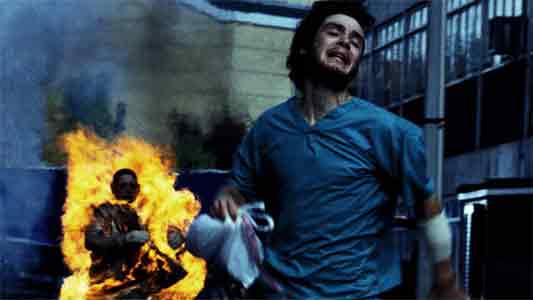
Now I'm not about to say Danny Boyle was wholly original with 28 Days Later, the notion of the infected had been explored in depth in movies like Last Man on Earth and indeed in Romero's very own The Crazies (1973), but it was the first time a Director had taken the concept of a zombie movie, post Romero, and applied it to an infected movie. Please note here we are not talking plague movies like The Stand (1994) or Contagion (2011), we're talking movies that see the infected attack non-infected like crazed badgers on steroids. Like Romero Boyle states the zombie/infected are the least of your problems, your real issues are going to be with other survivors, an idea Robert Kirkman certainly takes up in his current epic zombie affair. Strangely traditional zombie fans are more accepting of the notion of the infected as zombies than Romero influenced fans, who in a lot of cases naively believe Romero created the whole zombie thing.
So what is the basis for the argument? Romero zombie lovers claim a zombie has to be a re-animated dead person, and this is the apparently the major criteria. This notion strangely leads to a lot of people claiming Sam Raimi's Evil Dead trilogy are zombie movies! Okay even I draw the line at people and dead bodies being possessed by demonic entities as having anything remotely to do with a zombie movie, but then if you want to call them zombie movies be my guest, you are wrong but it's not going to lead to the collapse of the dark genre. Actually I'll get back to the demonic possession angle later in this article as there is a series of zombie movies based directly on this concept surprisingly.
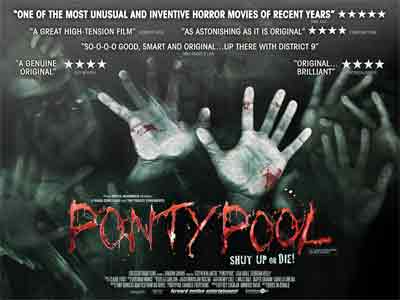
Supporters of the infected simply point out zombie does what zombie does regardless of their previous state of being. In this view the infected of 28 Days Later and the sequel 28 Weeks Later are to all intents and purposes zombies due to their actions. The infected chase after non-infected and rip them apart, just like zombies do in any number of Romero epics. The view is that zombies are defined by their characteristics not by any supernatural notion of resurrection, which certainly works when adding fast running "zombies" into the equation, this aspect doesn't work so well in my opinion for rom-zom outings.
Assuming you are at all interested in this argument then it's up to you to make your mind up on which camp you belong in. For the record I would argue that if you are going to exclude the infected then you pretty much need to exclude rom-zoms as well. Arguing that the zombie genre is never going to evolve in new directions points out that the Romero "ghouls" were not in fact zombies according to the body of work preceding the 1960s. It is highly illogical to argue one point on a single notion and then simply disregard the dozens of movies that established the zombie genre prior to the rules apparently being set in stone by Night of the Living Dead. Once again, as is common in horror, we see the print media inserting a false definition and then propagating what amounts to a lie, all due to poor journalism. The unfortunate thing is people then believe that lie and the wheels on the bus go round and round. A similar thing happened with the "final girl" notion which was basically invented by Carol J. Clover in 1992 to back up her didactic view of the slasher sub genre, it's patently incorrect but has become so engrained that even fans of the dark genre have assumed it to be correct. To sum up, the idea of the rom-zom being the only zombie is something invented by the print media that is simply lapped up by horror fans without question, if you believe in this notion than as stated carry on but please note many others disagreed with it.
[Editor's Note: Our next series of articles will explore the whole concept of the slasher movie and once and for all make a definitive statement on the final girl issue. ScaryMinds versus Carol J. Clover, you're going down!]
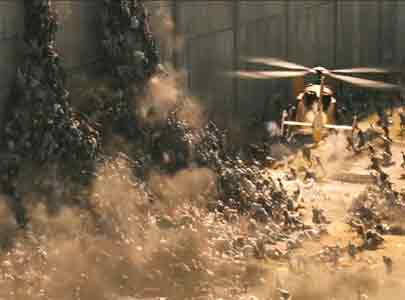
While 28 Days Later introduced the infected as fast moving "zombies" it wasn't long before other Directors and Writers picked up on the notion and we had a plague of fast moving zombie movies, including ironically Zack Synder's remake of Dawn of the Dead (2004). This naturally lead to increased debate about whether or not fast moving zombies were the business, or simply an aberration that would eventually fade away leaving the wasteland for Romero's shamblers. As World War Z (2013) demonstrated, fast moving zombies haven't gone quite as quickly into that dark night as some people expected. Interestingly World War Z postulates that zombies will not prey on people with infectious diseases, which is either a snipe at infected supporters or yet another attempt to revitalise what is increasingly becoming a stale sub genre.
While I personally prefer slow shamblers I've got nothing against the fast moving greyhounds of the zombie world. I'm yet to really run across a movie that does them service, if we exclude the infected movies for the time being, so fingers crossed someone will nail the concept sometime soon. Feel free to write on in if you are aware of any movies that might fit the bill, there's so many zombie movies coming out currently that I'm fighting to stay ahead of the feeding frenzy.
Naturally the zombie genre isn't letting any moss gather on decaying feet and a number of trends, or at least attempts by individual film makers, promises to move the sub genre into new and interesting directions. At the forefront of this is of course attempts at placing zombies into comedies and heaven forbid comedic romance movies, there has even been a recent attempt at "Twilighting" the sub genre, which thankfully crashed and burned. Ladies decaying dudes have pieces falling off them, this is in no way a romantic notion, we're talking rot and decay yo!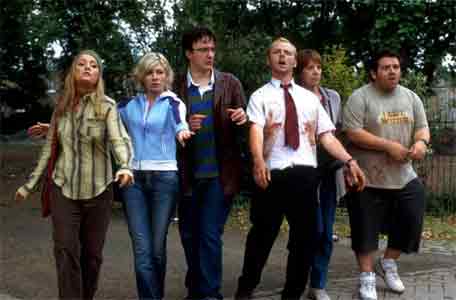
Shaun of the Dead (2004) kicked off a new cycle of comedic zombie movies, which will either spell the end of the sub genre or give it the boot up the arse it needs. When I say new cycle I clearly aren't including movies like The Return of the Living Dead franchise or indeed Peter Jackson's Braindead (1992). Shaun put the fun back into proceedings as the undead continued to trudge along in movie after movie, and directly influenced movies as diverse as Zombieland (2009), Stalled (2013), and the wonderfully insane Troma offering Poultrygeist: Night of the Chicken Dead (2006). Zombie comedy is another trend that shows no sign of ending any time soon, which is probably a good thing as there are some fine movies being made which sprinkle normal zombie mayhem with a comedic angle.
Worrying trends have been the fore mention attempt at attracting tween and young teen girls to the bloodbath through the regrettable Warm Bodies (2013), and a recent surge in period zombie movies. We're talking The Asylum's Abraham Lincoln vs. Zombies (2012) and Exit Humanity (2011) for example. Thankfully neither trend looks likely to take off to any great extent making cinemas safe once again for your average zombie loving citizen. Actually there was an Australia comic that involved ancient Rome and zombies which could have cool, think the comic only ran a couple of editions however.
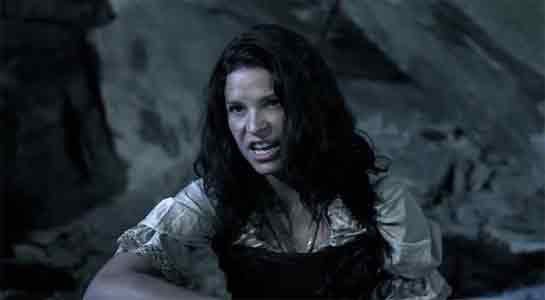
In amongst the trends we hope don't establish themselves are a number of movies attempting to do something more interesting with the zombie sub genre than the run of the mill flicks clogging DVD stores currently allow for. Pontypool (2008) postulates that communication between organisms can throw people into a rage like state. While the science is whacky at best, it's still an interesting concept. Likewise Zombie Honeymoon (2004) overcomes its "B" movie title to present zombification as a gradual wasting away and asks the audience how much you would do for a loved one. While these movies are the tip of the iceberg, that iceberg is pretty much all forzen poo underwater. I don't have room to talk about the 101 other zombie flicks that are good entertainment, even the venerable Hammer Films threw up a decent effort, but believe me there is some very find zombie cinema to be had if you are prepared to sift through the debris thrown on our screens each year.
Spanish film makers Jaume Balagueró and Paco Plaza deserve special mention for taking the zombie movie by the scruff of the neck, giving it a good shack, and then producing a pretty unique take on the rotting corpse. [Rec] (2007) was a found footage movie that pretended to be a zombie movie, people trapped by the Authorities in an apartment building along with a fire brigade team and the two reporters who were with the brigade, but which then moved into far darker waters. While found footage had previously proved attractive to zombie film makers, including George A. Romero (Diary of the Dead (2007)), Balagueró and Plaza used it to stunning effect and surprised audiences with one hell of a twist. While the movie lost some viewers, the twist is sort of left hanging out to dry, 2009 saw [Rec] 2 which expanded on the basic story to fully explain the demonic angle the first movie had mooted. While no doubt some people will develop problems with the [Rec] franchise being labelled zombie movies, I would defy anyone to watch the movies and then defend them being anything else. For those who want to groove to the movies there is also a third movie in the franchise, [Rec] 3 Genesis available and a fourth movie, [Rec] 4 Apocalypse is promised for this year.
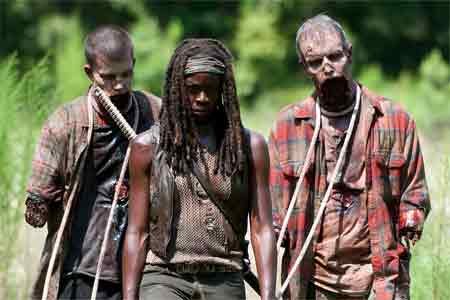
Clearly the zombie sub genre, as it always has done, is evolving to new ideas and concepts of how to present the subject matter to an audience that is increasingly cynical and hard to please. While trad-zom probably won't work for modern audiences, rom-zom doesn't either as the box office would attest, the infected have certain had decent results in the past but it has been a while between drinks for that motley crew. World War Z certainly pointed out there is an audience for a zombie flick if it's an event movie, but once again the zombies evolved from fast runners to having almost insect like group minds. Zombie movies cannot guarantee Brad Pitt will be there to help sell them either, so it might be a while before we see another major attempt in the cinema. On the small screen The Walking Dead continues to break records, and stays wonderfully true to rom-zom sensibilities, with a second spin off series planned all could be good with this particular medium. Comics have always been a happy hunting ground for zombies and that situation hasn't changed, besides The Walking Dead there's any number of anthologies available including Australia's very own Decay magazine that regularly run zombie stories, in particular Oz Zombie, a loose grouping of yarns featuring Australia after the apocalypse goes down. Similar there's a never ending supply of books with zombie flavourings, though to be honest the quality there is pretty much hit or miss.
On any given day you can wander down to your local DVD store and check new releases for a zombie movie or two. For the purpose of this article I went into my local JB HiFi outlet and had a choice of Stalled (2013) or Knight of the Dead (2013). The first movie was a comedy, set in a toilet surprisingly, while the second movie was another dreary entry in the historic zombie landscape, this time featuring Crusaders guarding a Monk and the Holy Grail while battling assassins and flesh hungry zombies, I kid you not. The problem with the DVD market is that there is a ready and willing audience that will lap up anything with a zombie involved; hence we are getting a continual spew of sub par movies that make you wonder exactly what drugs some folk are on. Okay people really want to crack into the movie industry, but heck some talent would be a requirement for anyone not working for The Asylum. Anyways for those interested I picked up the Brit comedy flick Stalled.
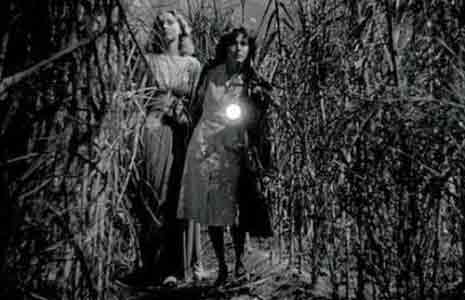
So in the wash up, with blood under the bridge, where are we at with this debate? How many angels can dance on the head of a pin comes to mind, however there are people out there with firm views that won't change them regardless of evidence. Primarily rom-zom supporters cannot conceive of a zombie movie that doesn't involve the resurrection of the deceased, regardless of what went before Romero's ground breaking work or in fact what has gone since. They are the conservatists of the debate, things are set in stone and can't be changed regardless, supporting them is a lazy media and Reviewers it should be added who wouldn't know a zombie if it leaped out of the bushes and bit them on the arse. Aligned against the rom-zom support base is a loose coalition of people with broader views. Traditional zombie supporters would argue that while Romero redefined the zombie in film, he wasn't the only one laying down a blue print and for sure doesn't take into account the source material. They would argue movies like White Zombie, where the victims of zombification are still alive, is closer to the reality than Hollywood could ever conceive. Strangely the Traditionalists are more open to interpretation than most of the other groups out there, they realise things are fluid when it comes to the sub-genre. And finally there's a group of modernists who would argue that the rom-zoms and trad-zoms are tired old clichés, the infected and more recent movies are taking the zombie sub-genre in new directions. The major argument for modernists is whether fast moving or slow moving infected/zombies is the business, and to be honest there's quite possibly more heat in this debate currently than rom-zom and trad-zom supporters can generate over their disagreement. To be honest, which we are being, a movie will no doubt be released soon that takes things in a completely unknown direction, and then the debate can spark into life yet again.
So where do I stand on the whole zombie war thing, firmly in what I would call the evol-zom camp. Basically if it acts like a zombie then it's a zombie regardless if it's infected by a virus, has resurrected from the grave, or is the victim of arcane voodoo practices. The zombie must evolve to survive, who wants to go see the same movie over and over again, Bogans are excluded here, throw something new into my dinner bowl and I'll be happy. I'll be over joyed if something cool shows up in my cinema, The Walking Dead has me covered on rom-zoms, I don't need to see yet another movie that has survivors holed up in a single location that are under siege by ghouls, I've seen that movie a zillion times before. Take another angle, try a new perspective, and just entertain us. Is that too much to ask?

